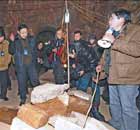Asia-Pacific
Return to Six-Party Talks on table
By Ai Yang and Zhang Haizhou (China Daily)
Updated: 2010-02-10 06:49
 |
Large Medium Small |
Latest signals from the Democratic People' Republic of Korea (DPRK) and diplomatic efforts are pointing to a reopening of stalled Six-Party Talks over the nuclear issue on the Korean Peninsula, analysts have said.
On Monday, DPRK top leader Kim Jong-il assured a high-level Chinese envoy that Pyongyang is committed to a nuclear-free peninsula, the Xinhua News Agency reported Tuesday.
Kim reiterated on Monday the DPRK's "persistent stance to realize the denuclearization of the Korean Peninsula" in talks with Wang Jiarui, head of the International Department of the Communist Party of China Central Committee.
"The sincerity of relevant parties to resume the Six-Party Talks is very important," Kim was quoted as saying.
Wang also delivered to Kim a letter from President Hu Jintao, in which he said Beijing is also ready to enhance cooperation and work with the DPRK to maintain peace and stability on the peninsula. Hu also invited Kim to visit China, Xinhua reported.
The DPRK abandoned the Six-Party Talks last year when the United Nations imposed new sanctions on it over its nuclear and missile tests.
Observers believe that China, the chair of the Six-Party Talks, wants to make Wang's visit an impetus to speed up coordination toward the resumption of the dialogue that also involves the Republic of Korea (ROK), Japan, Russia and the United States, Japan's Kyodo News reported.
The high-profile engagement this week with the North "may bode well" for reviving the talks that the DPRK has boycotted for a year and could lead to a reduction of tensions on the troubled peninsula, Reuters reported.
Though the DPRK offered "similar disarmament promises in the past", a Seoul-based analyst still called Kim's remarks this time a positive development, the Associated Press reported.
"I think Kim Jong-il will soon send his envoy to China to more clearly disclose his disarmament plan and set a date for his country's return to the Six-Party Talks," said Yang Moo-jin of Seoul's University of North Korean Studies.
To that effect, the DPRK's top nuclear envoy, Kim Kye-gwan, arrived in Beijing with Wang later yesterday, ROK's Yonhap news agency reported. Yonhap, citing unidentified diplomatic sources in Beijing, said the DPRK envoy's trip is aimed at discussing the talks.
"This is a sign that the resumption of the Six-Party Talks is imminent," Yang said.
UN chief Ban Ki-moon's top political adviser Lynn Pascoe also arrived in Pyongyang yesterday to try to bring the DPRK back to the negotiation table. Pascoe also met Foreign Minister Yang Jiechi in Beijing.
Despite the flurry of diplomatic activity, a number of analysts said it is still too early to know if the talks will reopen soon.
Pang Zhongying, an international relations expert at the Beijing-based Renmin University of China, said it is actually up to the US to make some changes before the talks can revive.
"Though the (Barack) Obama administration said it will engage the DPRK, it has made no actual breakthrough after sending Stephen Bosworth to Pyongyang in December," Pang said.
"The DPRK issue is not a priority for Obama's diplomacy," Pang said, noting that for the White House, Pyongyang comes after other issues including the war in Afghanistan, the Iranian problem and the Middle East situation.
The standstill will last for now, Pang said, adding that the talks may still open by this year.
The DPRK has made clear it wants sanctions lifted and a peace treaty to formally end the 1950-1953 Korean War before returning to the disarmament talks. Washington has responded that Pyongyang must come back to the talks first before any talk of political and economic concessions.
Wang Fan, a Korean studies expert at China Foreign Affairs University, also said the US should make concessions first to bring the DPRK back to the table.
"The bigger power won't lose anything by conceding first, as the DPRK is a small power and the disadvantaged side," he said.
"It won't be too late to sanction the DPRK, if it violates its pledges."
Wang said the current problem is one of a lack of trust.
"It seems most countries involved in the issue are still waiting for a change, or better, collapse, of the DPRK leadership, and not seriously seeking talks," Wang said.
"Mutual trust is the most important."










